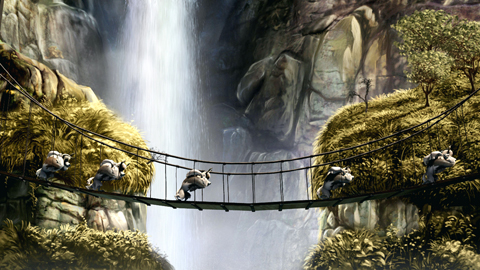In a busy office in downtown Kathmandu, young Nepalese are using state-of-the-art technology to create special effects for a Hollywood remake of the cult movie classic Straw Dogs.
Until recently, some of them had never even used a computer. Now, they are working for the likes of Walt Disney and Columbia Pictures at Nepal’s first special effects and animation studio. The company, Incessant Rain, is the brainchild of Kiran Joshi, who returned to his native Nepal to set up his own business in 2008 after a 17-year career in animation with US movie giant Disney.
Joshi, whose film credits include The Lion King and The Hunchback of Notre Dame, admits he had his doubts about going into business in one of the world’s least developed countries. But he says he was persuaded by the talent of the young artists he met when he returned to visit relatives in Nepal.

PHOTO: AFP/INCESSANT RAIN
“Every four or five years I would come back to Nepal on vacation, and I always kept an eye on how things were going, but I never thought the country was ready for an animation studio,” Joshi, 48, said in an interview.
“Then in 2007 I came here and met some artists. Everyone I met had one thing in common — they had great passion, but no guidance. They made me realize I had to do something,” he said.
Incessant Rain was the first firm in Nepal to specialize in visual effects for production companies overseas — already big business in India. Some special effects for James Cameron’s 3-D blockbuster Avatar were outsourced to India, whose animation and visual effects industry was estimated by industry body NASSCOM to be worth US$494 million in 2008.
NASSCOM forecasts the global animation market, worth US$68 billion in 2008, will grow to US$100 billion by 2012 as film and TV companies use more computer-generated imagery and seek to trim costs by outsourcing work.
Joshi believes Nepal has strong potential to tap into this market.
But he admits it is not always easy to do business in a country still struggling to recover from a decade-long civil war and beset by political instability.
“I thought the hardest thing would be to get the work up to a quality good enough for Hollywood,” Joshi says.
“In fact, that was relatively easy. The hard part was the logistics. We need to have our computers on 24 hours a day, because even at night they are processing images. So power cuts, diesel shortages — these are the things that distract you,” he said.
A culture of unwillingness to criticize colleagues’ work — or accept criticism of your own — also had to be overcome, Joshi says.
“That was hard — animation is very collaborative and you need to be able to provide constructive criticism. But many people here don’t like to say what they really think,” he says. “So we would take them out of the office environment, to a cafe perhaps, where they felt freer to speak.”
Incessant Rain began in early 2008 with 20 staff and for the first five months Joshi, who divides his time between Nepal and the US where his family still lives, concentrated on training them. Now the company employs 85 people, and works on homegrown animation projects as well as the more lucrative visual effects work, outsourced mainly from the US.
Among the staff is 24-year-old animator Newerashmi Bajracharya, who says the profession combines her fine arts background with her love of acting.
“Our job is to bring the characters to life,” says Newerashmi, who recently worked on the ultimate cartoon character, Mickey Mouse, for a promotional film marking the Disney Channel’s South Asian launch.
“The viewers should feel that the characters are not just puppets but are real,” she says.
Working on big Hollywood productions might seem like the more glamorous side of the business, and it is certainly the most lucrative.
But the work is not always creative — one of the most commonly outsourced tasks is wire removal, where an artist has to spend hours digitally erasing traces of the cables used by actors performing stunts.
Animation allows much more creative input, and Joshi says he most enjoys working on local projects, such as a recent series of short animated films promoting the work of the UN World Food Programme (WFP) in Nepal.
One WFP film features an animated version of Everest summitteer Nim Doma Sherpa, a one-time beneficiary of UN food aid, while a series of commercials for local bank Ace shows Nepal’s famous one-horned rhino in cartoon form.
Joshi’s next ambition is to make an animated feature film in Nepal.

STEPPING UP: Diminished US polar science presence mean opportunities for the UK and other countries, although China or Russia might also fill that gap, a researcher said The UK’s flagship polar research vessel is to head to Antarctica next week to help advance dozens of climate change-linked science projects, as Western nations spearhead studies there while the US withdraws. The RRS Sir David Attenborough, a state-of-the-art ship named after the renowned British naturalist, would aid research on everything from “hunting underwater tsunamis” to tracking glacier melt and whale populations. Operated by the British Antarctic Survey (BAS), the country’s polar research institute, the 15,000-tonne icebreaker — boasting a helipad, and various laboratories and gadgetry — is pivotal to the UK’s efforts to assess climate change’s impact there. “The saying goes

Floods on Sunday trapped people in vehicles and homes in Spain as torrential rain drenched the northeastern Catalonia region, a day after downpours unleashed travel chaos on the Mediterranean island of Ibiza. Local media shared videos of roaring torrents of brown water tearing through streets and submerging vehicles. National weather agency AEMET decreed the highest red alert in the province of Tarragona, warning of 180mm of rain in 12 hours in the Ebro River delta. Catalan fire service spokesman Oriol Corbella told reporters people had been caught by surprise, with people trapped “inside vehicles, in buildings, on ground floors.” Santa Barbara Mayor Josep Lluis

Police in China detained dozens of pastors of one of its largest underground churches over the weekend, a church spokesperson and relatives said, in the biggest crackdown on Christians since 2018. The detentions, which come amid renewed China-US tensions after Beijing dramatically expanded rare earth export controls last week, drew condemnation from US Secretary of State Marco Rubio, who on Sunday called for the immediate release of the pastors. Pastor Jin Mingri (金明日), founder of Zion Church, an unofficial “house church” not sanctioned by the Chinese government, was detained at his home in the southern city of Beihai on Friday evening, said

SANCTIONS: Congolese Minister of Foreign Affairs Therese Kayikwamba Wagner called on the EU to tighten sanctions against Rwanda during an event in Brussels The Democratic Republic of the Congo (DR Congo) has accused the EU of “an obvious double standard” for maintaining a minerals deal with Rwanda to supply Europe’s high-tech industries when it deployed a far-wider sanctions regime in response to the war in Ukraine. Congolese Minister of Foreign Affairs Therese Kayikwamba Wagner urged the EU to levy much stronger sanctions against Rwanda, which has fueled the conflict in the eastern DR Congo, describing the bloc’s response to breaches of the DR Congo’s territory as “very timid.” Referencing the EU’s response to Russia’s invasion of Ukraine, she said: “It is an obvious double standard